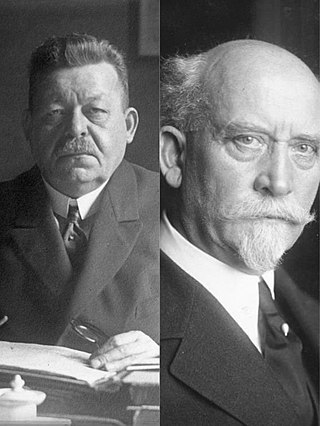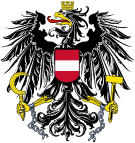
Parliamentary elections were held in Austria on 24 April 1983. The result was a victory for the Socialist Party, which won 90 of the 183 seats. However, the Socialists lost the outright majority they had held since 1971, prompting Bruno Kreisky to stand down as SPÖ leader and Chancellor in favour of Fred Sinowatz. The SPÖ stayed in office by entering into a coalition government with the Freedom Party of Austria, which at this point was a liberal party. Voter turnout was 93%.

Parliamentary elections were held in Austria on 10 May 1959. Although the Socialist Party (SPÖ) received the most votes, the Austrian People's Party won one more seat than the SPÖ. The Communist Party of Austria lost its remaining three seats and has not returned to the National Council since. Voter turnout was 94%. The grand coalition that had governed the country since 1945 remained in office, with People's Party leader Julius Raab as chancellor and Socialist leader Bruno Pittermann as vice-chancellor.

Federal elections were held in Germany on 19 January 1919, although members of the standing army in the east did not vote until 2 February. The elections were the first of the new Weimar Republic, which had been established after World War I and the Revolution of 1918–19, and the first with women's suffrage. The previous constituencies, which heavily overrepresented rural areas, were scrapped, and the elections held using a form of proportional representation. The voting age was also lowered from 25 to 20. Austrian citizens living in Germany were allowed to vote, with German citizens living in Austria being allowed to vote in the February 1919 Constitutional Assembly elections.

Parliamentary elections were held in Austria on 17 October 1920, although they were not held in Carinthia until 19 June 1921 and in Burgenland until 18 June 1922. They were the first regular elections held after a permanent constitution was promulgated two weeks earlier.

Early parliamentary elections were held in Moldova on 27 February 1994. They were the country's first competitive elections, and followed deadlock in Parliament over the issue of joining the Commonwealth of Independent States. The result was a victory for the Democratic Agrarian Party of Moldova (PDAM), which won 56 of the 104 seats.

Legislative elections were held in Cisleithania, the northern and western ("Austrian") crown lands of Austria-Hungary, on 14 and 23 May 1907 to elect the members of the 11th Imperial Council. They were the first elections held under universal male suffrage, after an electoral reform abolishing tax paying requirements for voters had been adopted by the Council and was endorsed by Emperor Franz Joseph earlier in the year. However, seat allocations were based on tax revenues from the States.

Legislative elections to elect members of the Imperial Council were held in Cisleithania, the Austrian section of Austria-Hungary over several days in June and July 1911. A coalition of German national and liberal parties, the Deutscher Nationalverband, emerged as the largest bloc in Parliament, holding 100 of the 516 seats. Voter turnout was 80.2%.

Constituent Assembly elections were held in Austria on 16 February 1919.

Parliamentary elections were held in Austria on 21 October 1923. The result was a victory for the Christian Social Party, which won 82 of the 165 seats. Voter turnout was 87.0%.

Presidential elections were held in Austria on 23 May 1965, following the death of incumbent President Adolf Schärf on 28 February. The result was a victory for Franz Jonas of the Socialist Party, who received 51% of the vote. Voter turnout was 96%.

Presidential elections were held in Austria on 25 April 1971. The result was a victory for incumbent President Franz Jonas of the Socialist Party, who received 53% of the vote. Voter turnout was 95%.

General elections were held in Liechtenstein on 11 March 1918, with a second round on 18 March. They were the first elections held in the country contested by political parties, as the Christian-Social People's Party and Progressive Citizens' Party had been founded that year. The Progressive Citizens' Party emerged as the largest in the Landtag, winning seven of the 12 elected seats.
The German People's Party was a political party of the German-speaking group in the Cisleithanian part of the Austro-Hungarian Empire. It was founded in 1896 as a successor to the German National Party and was led by Otto Steinwender.

The German Freedom and Order Party was a political party in Austria.

The Centrist Democrats was a political party in Austria.

The German-National Party was a political party in Austria.

The German Democrats was a political party in Austria.

The Styrian Farmers' Party was a political party in Austria.

The Liberal Corporate Association of Salzburg was a political party in Austria.

The Agrarian Union Party was a political party in Romania.


















